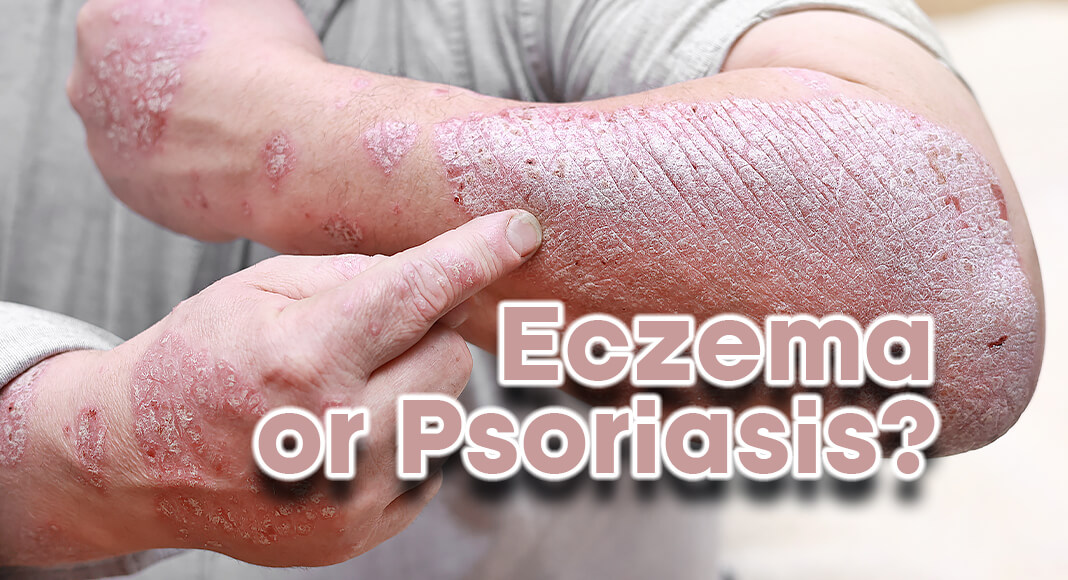
Mega Doctor News
by Rush University Medical Center
Newswise — Eczema and psoriasis are common skin conditions, and they can both appear as rashes that may itch or burn. If you get rashes often, you might wonder if you have one or the other. In fact, you could have both eczema and psoriasis at the same time, but it’s rare.
While both have a few things in common, there are some differences in symptoms, causes of flare-ups and health risks. That’s why you should see a dermatologist for a proper diagnosis if you have symptoms.
“Both eczema and psoriasis can impact your sleep, mood and quality of life, so it’s important to seek help if you are struggling with these conditions,” says Catherine Emerson, MD, a dermatologist at RUSH.
Understanding the differences between psoriasis and eczema can help you make sure you’re taking the right steps to avoid flare-ups and get the treatment you need.
How can you tell if you have eczema or psoriasis?
Both eczema and psoriasis can appear as dry, flaky skin that may itch or burn. It can be hard to tell which you have just by looking. But there are a few key differences that might clue you in.
Both conditions can appear at any age, but eczema usually starts to present in childhood. It often develops along with allergic rhinitis and asthma, and together these conditions are sometimes called the “atopic triad.”
Eczema also tends to be itchier than psoriasis and appear in “flexural” areas. These include the insides of the elbows and behind the knees.
“Itch is a defining feature of eczema,” Emerson says. “In fact, it is often called ‘the itch that rashes.’ It can present as dry patches, bumps or even fluid-filled blisters.”
Psoriasis can also cause itchiness, or it may not itch at all. The spots that appear are red, thick and scaly plaques that have defined edges.
“Psoriasis classically involves the scalp, elbows and knees but can also involve skin folds such as in the groin or genital region, as well as the hands and feet,” Emerson says.
A dermatologist can easily tell the difference between psoriasis and eczema, so getting an examination will be the best way to know for sure which condition you have.
What are the different causes of eczema and psoriasis?
Both eczema and psoriasis have causes related to genetics and environmental factors. They also both result from overactive immune responses that lead to inflammation.
“We think that eczema is related to a defective skin barrier that doesn’t do a good job of keeping water in and irritants and allergens out,” Emerson says.
Overly hot showers and harsh soaps that remove oil from the skin can lead to flare-ups of eczema. Irritants like wool and fragrances in laundry detergent or perfumes can also be triggers.
While psoriasis has a genetic cause like eczema, environmental factors can increase the risk of developing it. Certain medications, including beta-blockers and drugs to treat malaria, have been linked to psoriasis. Other medications, like those used to treat depression and mental health issues, can worsen the condition.
Some infections can contribute to psoriasis, as well, and as with many conditions, obesity and smoking can increase the risk of developing psoriasis.
What are the health risks?
Both eczema and psoriasis can put you at risk for other conditions. They can disrupt your sleep and worsen mental health issues. Excessive scratching or dryness can also lead to breaks in the skin, which can leave you open to secondary infections.
With psoriasis, the overactive immune response leads to inflammation not just in the skin, but in other organs of the body. People with psoriasis are at higher risk for developing metabolic syndrome and arthritis, among other conditions.
“Psoriatic arthritis can develop in about 30% of individuals with psoriasis,” Emerson says.
It’s important to get treatment for both conditions not only to prevent rashes and itchiness, but to protect your overall health.
What are the treatments for psoriasis and eczema?
Mild cases of eczema and psoriasis are both often treated with topical anti-inflammatory medications, including corticosteroids and non-corticosteroids. Your dermatologist can prescribe these creams and lotions and instruct you on how to use them and the possible side effects.
With eczema, your dermatologist will also likely recommend avoiding triggers, like overly hot showers, fragrances and irritants. They may suggest that you switch to a less harsh soap and use moisturizer after bathing.
For more severe cases of eczema and psoriasis, treatment options may include light therapy, oral immunosuppressant drugs or injectable medications.
Since there is a risk that psoriasis may lead to psoriatic arthritis, your physician may also prescribe oral and injectable medications that treat both the skin and the joints.
“A dermatologist can talk with you about the benefits and risks of these different options and come up with a treatment plan that works for you,” Emerson says.








